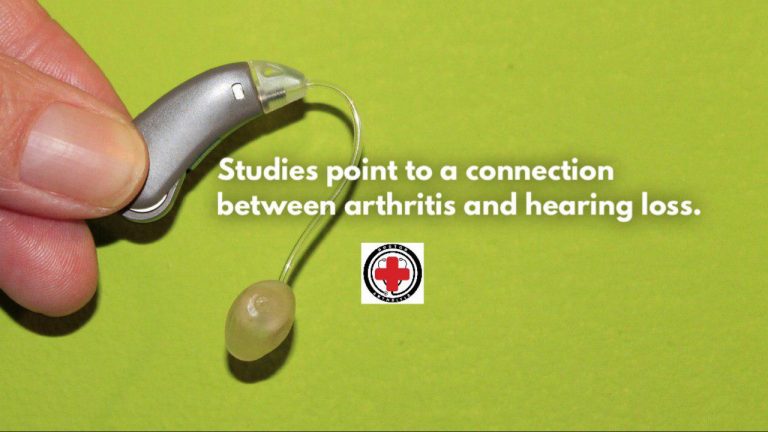With over 1 million orders

IS THERE A CONNECTION BETWEEN HEARING LOSS AND ARTHRITIS?
As if arthritis sufferers don’t have enough to worry about, reports now point to a connection between arthritis and hearing loss.
While both conditions are typically associated with ageing, recent studies are drawing attention to the fact that hearing loss seems to be more common among people who suffer from one of the most common forms of arthritis, such as RA (rheumatoid arthritis) and PsA (psoriatic arthritis.)
“Clinical trials have found higher rates of sensorineural hearing loss – a type of hearing loss usually caused by poor function of the hair cells in the cochlea – in patients with rheumatoid arthritis (RA).”
But is there really a connection between hearing loss and arthritis? Let’s check out the facts.
Research and Studies
In 2006–
A study published over a decade ago saw that sensorineural hearing impairment was common in 42.7 percent of patients with RA.
Smaller studies also delivered similar results and added PsA and JIA (juvenile idiopathic arthritis) to the list of arthritis types that have shown a link to hearing loss.
However, in the same year, the Mayo Clinic debunked all claims with the publication of research that shows there’s no significant link between RA and hearing loss. It did however conclude that RA sufferers were also more likely to perceive hearing problems.
In 2012–
A study published in The American Journal of Epidemiology saw that go-to drugs used to treat arthritis symptoms could also be to blame. In the study, women who took Ibuprofen and Acetaminophen two or more days per week reported more hearing loss than those who rarely took the OTC painkillers.
According to findings, there was a correlation between frequent dosage. Women who took ibuprofen two to three times weekly saw a 13 percent increase in hearing loss risk; while those who took it six to seven times weekly had a 24 percent risk.
Researchers speculate that the medication reduces blood flow to the cochlea or could be causing depletion of factors that help prevent damage.
In 2016–
Similar to the 2006 study, sensorineural hearing loss was found to affect 72 percent of patients in some studies conducted by Dr. Emamifar. His review concludes that patients with RA are in fact at a higher risk of hearing impairment as opposed to healthy subjects involved in the study.
Despite findings that point to how hearing impairment is caused by multiple factors, the mechanisms by which hearing loss happens and the risks are still unclear and will require further study.
In 2019–
A more recent study conducted in Korea is currently explore the connection between the increased risk of sudden sensorineural hearing loss in patients with rheumatoid arthritis. Findings show that people with RA, specifically those 50 years old and older, were also 40 percent more likely to develop sudden hearing loss, than those without RA.
This type of rapid, sudden and unexplained hearing loss affects just one ear and can occur among those who suffer from autoimmune forms of arthritis and may have something to do with exposure to certain drugs.
Making the Connection
Among these numerous studies, the link between arthritis and hearing loss could point to the following–
-
The joints between the tiny bones inside the ear could be more prone to damage if someone suffers from inflammatory arthritis, similar to how it affects larger joints in the body.
-
While it’s more common for rheumatoid nodules to develop in pressure points under the skin, it’s not unlikely for these nodules to develop in the ears, which could interfere with hearing.
-
With RA, the body overproduces antibodies and antigens—the deposits could possibly cluster on hair cells in the inner ear and can destroy the cells.
-
A serious complication of RA, which leads to inflammation of blood vessels can damage the cells’ ability to deliver sound information to the auditory nerve and brain.
- Common medication used to treat symptoms of arthritis affect hearing.
Should You Worry?
It’s not completely unheard of for arthritis patients to have developing hearing impairment, especially when you consider that age plays a factor in the onset of both. However, screening for hearing loss, especially for RA patients, means you can potentially catch the onset of impairment early.
Symptoms of hearing loss are usually subtle, so pay close attention to it. If it suddenly seems like your ear is blocked, or if you’re unable to pick up certain words during conversation, even something as simple as you beginning to hear a ringing or noise in the ear—all these might be symptoms worth checking and consulting with your physician. Prompt assessment and treatment is critical to preventing further damage.
